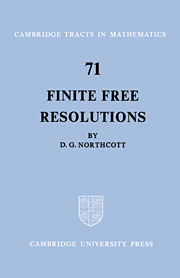Book contents
Summary
This Cambridge Tract originated in a seminar given by J. A. Eagon while he was visiting Sheffield University during the session 1972/3. The aim of the seminar was to report on some recent discoveries of D. A. Buchsbaum and D. Eisenbud concerning finite free resolutions. I found myself fascinated by the subject and Eagon and I had many discussions on different aspects of it. In the end we were able to construct what we considered to be a simplified treatment of certain parts of the theory, and our ideas appeared subsequently in a joint paper.
I continued to think about these matters after Eagon had left Sheffield, and during 1973/4 and 1974/5 gave seminars covering an enlarged range of topics, but still using what I regard as elementary methods. The elementary approach was based on the belief that, for those sections of the theory I was considering, Noetherian conditions were never really necessary; consequently I was committed to showing that, where such considerations had previously been used, a way of getting rid of them could be found. Now the parts of the theory in which Noetherian properties had originally played an apparently vital role were, to a considerable extent, concerned with applications of the concept of grade; and I had, for some time, known of M. Hochster's approach to a theory of grade in which it was not necessary to restrict oneself to Noetherian modules.
- Type
- Chapter
- Information
- Finite Free Resolutions , pp. xi - xiiPublisher: Cambridge University PressPrint publication year: 1976



